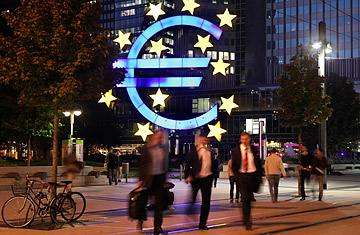
Pedestrians pass in front of a Euro sign sculpture outside of the European Central Bank (ECB) headquarters in Frankfurt, Germany, on Tuesday, Sept. 20, 2011.
(2 of 2)
Demand for louvered windows is holding up better. Isabel's father, who used to run the company initially resisted developing the product line which he thought too ugly. After pressure from clients he built a prototype to prove its aesthetic deficiencies and showed it at trade fair. It was a surprise hit. "My father always says, the bad ideas come up trumps and the good ones never work," she says.
That description might be also said to fit the single currency, although the directors of Glasbau Hahn still consider the euro a good idea that could and must be made to work. "If Europe slides back into individual currencies, then I don't believe it will be possible to maintain the continent's living standards or economic strength," says Tobias.
Germany's labor market remains strong, with unemployment standing at 7%, but economic growth has stalled and government debt is mounting. Tensions in the governing coalition are worsening. After parliamentary elections in 2009, Merkel's Christian Democrats and Bavarian sister party the CSU formed a coalition with the Free Democratic Party (FDP), an economically liberal party that presents itself as the champion of the Mittelstand. The constellation was expected to be able to govern more decisively than Merkel's previous "grand coalition" with the Social Democrats (SPD). The opposite has proved true. Poor results in state elections have increased friction between the governing parties and dissidence within their own ranks. On Sept. 18, the FDP chalked up its worst result since World War II in the Berlin state election, losing its representation in the state parliament. Merkel's own party performed badly too.
If that weren't enough to instill extra caution in Germany's characteristically cautious Chancellor, there's the legacy of Germany's expansionist history to contend with. Gunther Hellmann, a political scientist at Frankfurt's Johann Wolfgang Goethe-University, says, "you instantly gather the connotations that come along in the German context when you're talking about 'Führung' — leadership." Hellmann says she's in a no-win situation. "If you take leadership, and tell others 'this is where we should go,' there will be outcry," He says. "If you proceed carefully, it's 'no leadership from Germany.'"
Ironically, if Merkel is to lead euro zone countries to safety, her first duty is arguably not to expand German sway but to cede further power to the European Union and to persuade other nations to do the same. "With the European Union, we Europeans have realized a dream for ourselves. We live in peace and freedom. That naturally entails giving up some powers to Brussels, which isn't always pleasant," Merkel told TIME in an interview at the end of 2009. "But it's necessary. The greatest consequence of globalization is that there aren't any purely national solutions to global challenges." She did not foresee how severe those challenges might be or how many powers she might be called upon to cede if the euro zone is to remain intact. It has become clear that the single currency can only work if there is a greater degree of fiscal and political union among its 17 members.
The break-up of the euro zone is a prospect so chilling to Washington that U.S. Treasury Secretary Tim Geithner traveled to Poland earlier this month to urge European finance ministers to step up their response to the crisis. "They recognized the need to escalate. They're going to have to put a much more powerful financial framework behind this," he told ABC News in a Sept. 26 interview. But although markets surged on Sept. 27 after a meeting between Merkel and Greek President George Papandreo amid talk of a new rescue plan, its outlines are hazy and dealt a blow to Merkel's chances of winning the Sept. 29 vote to ratify the existing plan as members of her government balked at the idea of heftier commitments further down the line. And any plan — whether it involves pooling powers or dipping deeper into pockets — will have to be ratified by national parliaments.
Stark, the ECB's outgoing Chief Economist, offers a deceptively simple prescription for breaking the logjam. "We have always made good progress in European integration when European politicians set targets and exact dates," he says. "This worked with the single market in 1993. There was a target to achieve the single market in 1993. And then with the single currency which started in 1999. So why not set new targets, be more ambitious?" His proposal: the 17 euro zone countries should "move ahead, leaving others behind" in the push for integration, perhaps appointing a joint finance minister.
That's the sort of big idea that it's easy to deliver from above. On the streets of Frankfurt, it's a harder sell. "They say we have to save this," says Jens, the sausage seller, holding up a euro coin. "I say, Tell me how many of these it will cost me to save this. And they can't answer."
Catherine Mayer is London Bureau Chief at TIME. Find her on Twitter at @Catherine_Mayer or on Facebook at Facebook/Amortality-the-Pleasures-and-Perils-of-Living-Agelessly. You can also continue the discussion on TIME's Facebook page and on Twitter at @TIME.
